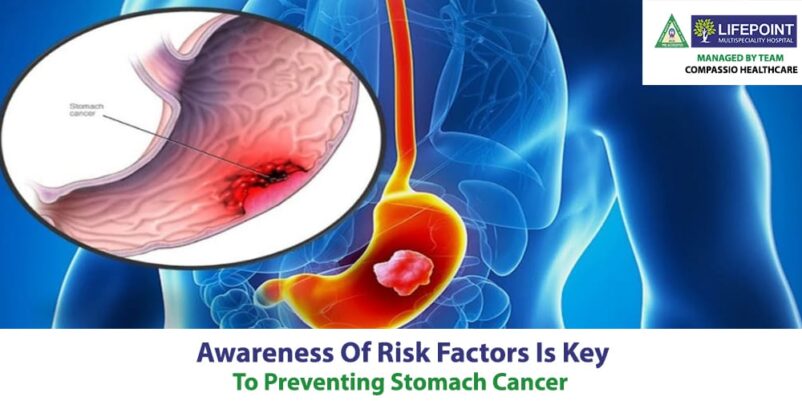Did you know that one of the best strategies to possibly lower your risk factors for stomach cancer is to adopt a healthy diet? Read on to learn more.
Similar to other cancer forms, doctors frequently are unable to pinpoint why one individual develops stomach cancer while another does not. Anywhere in the stomach can become cancerous, including the stomach. Since stomach cancer develops gradually over time and people rarely exhibit any symptoms in its early stages, it is difficult to diagnose and frequently goes unnoticed.
Although the prevalence of stomach cancer has decreased globally, it is still the third most frequent cancer in males and the fourth most common cancer overall in India.
But stomach or gastric cancer can occasionally be linked to known risk factors that raise a person’s likelihood of getting sick. So understanding the risk factors for stomach cancer is a positive step. You have no control over some risk factors, such as family history, but you can definitely make changes to your diet and stop smoking tobacco products.
It’s crucial to remember that eliminating risk factors does not ensure that you won’t develop cancer. Additionally, the majority of persons with a certain cancer risk factor do not actually develop the illness.
Advice on Preventing Stomach Cancer
The following steps can be taken to protect yourself from the possibility of having stomach cancer:
A balanced diet Consuming a diet high in fibre, vitamin A, and vitamin C may reduce your risk of developing stomach cancer.
Reduce your salt intake because it’s been suggested that it may increase your risk of developing stomach cancer. Limit or cut back on the salt you add to your food as a result.
Increase your intake of fruits and vegetables: Make an effort to incorporate a variety of fruits and vegetables at each meal. Oranges, lemons, and grapefruit are examples of citrus fruits that may be useful.
The single best thing you can do for your health is to stop smoking, so do it now. Numerous malignancies, such as those of the stomach, head and neck, larynx, esophagus, lung, bladder, kidney, and pancreas, are less likely to develop as a result.
Limit your usage of alcohol, and abstain from using tobacco products.
Reduce consumption of preserved foods: Steer clear of salted meats, fish, and pickled and smoked meals.
Reach a healthy weight: If you are overweight or obese, speak with your doctor about ways to achieve a healthy weight. Try not to set your sights too high straight away; everyone needs a varied amount of time to achieve their goals.
Family history of stomach cancer: Talk to your doctor about the risks of developing stomach cancer, especially if you have a family history of stomach cancer, chances are you might have inherited the DNA. You should consult your doctor and they will conduct some tests such as an endoscopy to look for any signs and symptoms of developing stomach cancer.
Early Diagnosis & Timely Treatment is Crucial to Saving Lives
Experts point out that the likelihood of a five-year survival rate increases with the timing of diagnosis and treatment of stomach cancer. According to the study, early-stage stomach cancer has a five-year survival rate of as high as 93.6% whereas later-stage cancer has a survival rate of fewer than 20%. (Depending on the general health condition of the patient).
In the early stages of stomach cancer, as was already said, there are hardly any noticeable symptoms, and even when there are, it could be challenging to identify it from gastric issues. You should be on the lookout for several symptoms, such as trouble swallowing, a stomachache, weariness, constipation, dark feces, abdominal swelling, severe indigestion, feeling bloated, etc. Consequently, it is wise to seek the advice of a specialist.
Except at the most advanced stage (stage IV), stomach cancer is curable with the right medical care. A number of established treatment approaches, including endoscopic mucosal resection (EMR) and endoscopic submucosal dissection (ESD), are available to treat early stomach cancer in a curative manner. These procedures are frequently available as alternatives to surgery for people with early stomach cancer. However, depending on the type, stage, and location of the disease, surgery may occasionally be paired with chemotherapy and/or radiation therapy to produce better outcomes.

